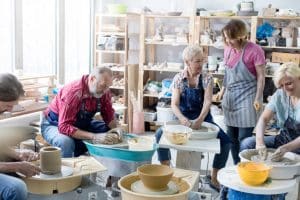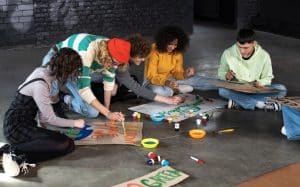At the heart of our psychological and emotional landscape lies an intrinsic need for a sense of belonging, inextricably connected to our mental and emotional fulfilment. This longing for interconnectedness is not unique to humans, it is a universal thread which binds all living beings. From the intricate networks between mighty trees to the social structures of the animal kingdom to the underground world of mycelium, and even on a microscopic level, between bacteria, forming connections is vital for the growth and vitality of all species. And, just like every other species, we require a certain level of depth of connection for this to cross the boundary into ‘belonging’ – whether this is to a group, community or ecosystem.
As inherently social beings, we humans are predisposed to seek out and create groups to belong to. These groups can be rooted in social relationships, spiritual or political affiliations, or common hobbies, skills or sports teams. Although each of us is an autonomous being, with our own individual identity marked by thoughts, feelings, opinions and personality, a significant aspect of our personal fulfilment and sense of identity emerges from our participation in groups.

This deep-rooted need for connection informs our desire to remain close to our families, communities and social groups, and to organise our sports and governments into teams. It underpins the formation of our primary and secondary attachments – and explains why lacking these can lead to mental and emotional distress.
Our need for a sense of connection is deeply woven into the fabric of our being. As social animals, naturally inclined to seek a sense of belonging for safety and fulfilment, our brains reward us for social interactions. When we socialise, the dopamine reward circuits in our brain, which control reward processing, release a cascade of feel-good chemicals and hormones which encourage and reinforce social behaviour.
Cultivating high-quality connections and being members of groups enables us to gain information and resources which may be beyond our reach as solitary individuals. These relationships assist us in carving out our identities and understanding our position in the world. They also make it much easier to reach goals; by sharing knowledge and collaborating on tasks, achieving what might be challenging or unattainable for one person becomes feasible.
Unpacking the Essence of Belonging
“A deep sense of love and belonging is an irreducible need of all people. We are biologically, cognitively, and physically wired to love, to be loved, and to belong” – Brene Brown
The word ‘belonging’, in this context, refers to our sense of connection with others, highlighting the fact that social connections don’t necessarily equate to a sense of belonging. It’s possible to have an extensive network of social connections and still experience a profound sense of lack of emotional validation. Consciously cultivating meaningful connections which provide emotional and relational satisfaction is crucial to forming and maintaining a true sense of belonging. A lack of sense of belonging has been proven to lead to depression more than loneliness or conflict.
It is also crucial to note that relying solely on others for a sense of validation can lead to a loss of a sense of identity independent from how others see us. Striking a harmonious balance between seeking external affirmation and fostering internal self-validation is crucial to avoid the extremes of codependency and isolation. If navigating this balance is proving challenging, seeking counselling support can be immensely beneficial. A professional integrative therapist can guide you in uncovering the roots of any imbalances in relationships with others and yourself, as well as in finding strategies to strengthen these connections.
The Vital Role of Connections in Our Lives
Our physiological and neurological systems are intricately designed to guide us, granting us signals which help us to understand when our behaviour is beneficial or detrimental. Studies show that social isolation triggers a craving response in our brains which is similar to hunger, indicating that the need for social connection is fundamental to our quality of life. Chronic social isolation and loneliness are also linked to lower mental and physical health – suggesting that positive and fulfilling social interactions are basic human needs, like food or sleep. However, a social interaction can be a 30-second conversation, or even the exchange of a smile and wave. The kinds of connections which fulfil our need to belong are much deeper.

Feelings of belonging are very important in helping us see the value in life and cope with grief and other adversities, painful experiences and emotions. A robust sense of belonging improves our motivation, helps us regulate stress, boosts resilience and happiness and is good for our physical health.
Social anxiety, amongst other factors, can make cultivating connections and a sense of belonging more difficult. This can then lead to a self-perpetuating cycle where social anxiety can cause you to avoid social situations, which then makes it more challenging to gain a sense of belonging. If you find yourself struggling with social anxiety, exploring mindfulness meditation, engaging in Cognitive Behavioural Therapy (CBT) exercises, or seeing a therapist can prove beneficial.
Building Blocks for a Stronger Sense of Belonging
- Be proactive – put conscious effort into seeking out spaces where you are likely to meet people you are aligned with. This might include joining a social or professional group, starting a new hobby or sport, or making a concerted effort in your relationships with friends and family.
- Challenge your core beliefs – many people who feel a consistent sense of disconnection, and particularly those who experienced this growing up, may harbour fundamental beliefs like ‘I don’t belong’ or ‘I don’t fit in’. Our brains have a tendency to accept these beliefs as truths, filtering out any information which contradicts them. By identifying and actively questioning these core beliefs and learning to challenge them, you can begin to dismantle them. Therapy can be a valuable resource if you find it challenging to pinpoint or counteract these ingrained beliefs.
- Be authentic – While the pursuit of belonging might sometimes suggest the need for change, particularly when the goal is to fit in, this approach can be counterproductive. We see this notably in adolescents, who may change their personalities, behaviour, likes and dislikes and outward appearance in order to fit in more closely with their social groups. However, belonging cannot be achieved through self-compromise. After all, if you aren’t being your true self, how can you truly belong?
- Be intentional in your connections – ensure that you prioritise connections with people who share your core values and principles. This doesn’t mean limiting your social circle to people who mirror your every trait, but rather ensuring the authenticity of your connections by aligning with those who resonate with your fundamental beliefs
Patience is key when forming high-quality connections. For a genuine sense of belonging to take root, the relationships we establish have to be fulfilling, meeting our emotional needs to feel seen, accepted and supported. Such connections must also be balanced, allowing us to reciprocate in kind. While interactions may offer immediate comfort and meet our initial need for connection, ultimately, these bonds are formed over time.
- About the Author
- Latest Posts
Co-founder and director of Leone Centre, 20+ years of experience supporting people, and offering valuable knowledge through Couples Counselling and Individual Counselling. Before becoming a therapist, I worked in the financial sector.

Get Started Today
with Leone Centre

BOOK NOW

Call us
020 3930 1007

View our therapists
Find your match


